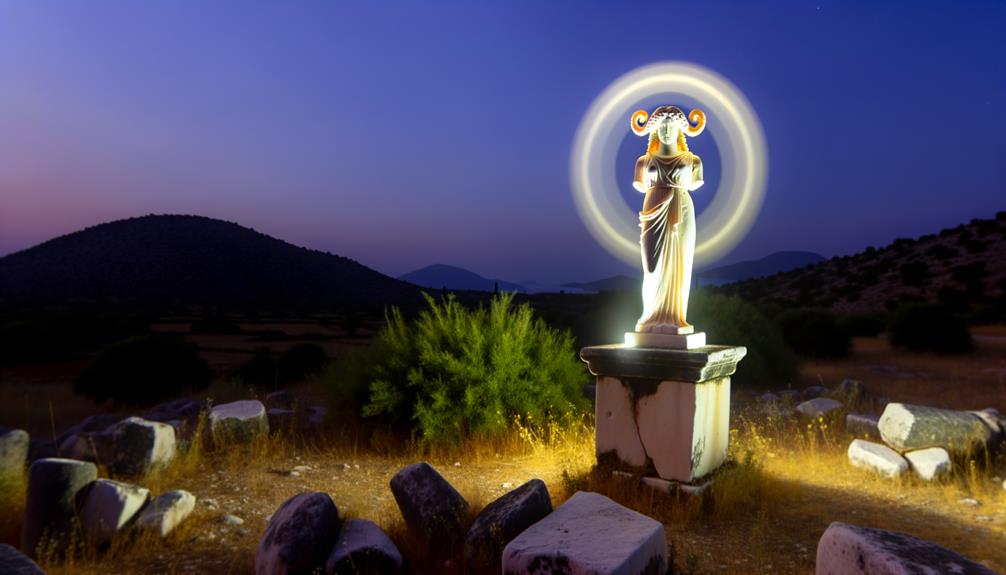Meaning of the Name Kassandra
The name Kassandra has deep roots in ancient Greek mythology. It derives from the Greek words 'kekasmai' (to excel, to shine) and 'aner' (man), suggesting a distinguished or radiant character.
Kassandra was a Trojan princess gifted with prophecy by Apollo, though cursed to never be believed. This imbued the name with themes of foresight and tragedy.
Throughout history, Kassandra has symbolized wisdom, prophetic insight, and resilience. The name maintains cultural significance, embodying empowerment and unique presence across various eras.
To uncover more about its nuanced legacy and modern interpretations, further exploration is recommended.

Key Takeaways
- Kassandra originates from Greek mythology, meaning "a distinguished or radiant character."
- The name symbolizes wisdom, foresight, and a tragic yet resilient spirit.
- Derived from Greek words 'kekasmai' (to excel) and 'aner' (man), indicating excellence and humanity.
- In mythology, Kassandra was a Trojan princess with the gift of prophecy, cursed to never be believed.
- Modern interpretations emphasize empowerment, resilience, and maintaining a unique presence.
Etymology of Kassandra
The name Kassandra originates from ancient Greek mythology, deriving from the Greek words 'kekasmai,' meaning 'to excel' or 'to shine,' and 'aner,' meaning 'man.' This etymological composition suggests a person of distinguished or radiant character.
In classical Greek, names often bore significant meanings that reflected the virtues or qualities admired in society. The linguistic structure of 'Kassandra' incorporates the prefix 'kekas-', indicating excellence or brilliance, fused with 'ander,' a form of 'aner,' denoting humanity or personhood.
This blend of elements underlines the importance of individual merit and societal contribution, emblematic of the era's cultural values. Understanding the etymology of Kassandra provides insight into how ancient Greeks used language to convey identity and esteem.
Mythological Origins
Rooted in ancient Greek mythology, Kassandra was a Trojan princess endowed with the gift of prophecy by the god Apollo. Despite her divine ability, she was cursed never to be believed, leading her prophecies to be dismissed. This tragic element of her story highlights the complexities of divine interaction in mortal affairs. The name Kassandra itself reflects themes of foresight and tragedy, as seen in various mythological narratives.
| Mythological Figure | Role | Significance |
|---|---|---|
| Kassandra | Trojan Princess | Gifted with prophecy, yet disbelieved |
| Apollo | God | Bestowed the gift of prophecy |
| Priam | King of Troy | Father of Kassandra |
Understanding Kassandra's mythological origins provides deeper insight into the cultural and linguistic heritage of the name.
Historical Context
In historical contexts, the name Kassandra has traversed various cultures, evolving in significance and pronunciation over centuries. Originating from ancient Greek mythology, Kassandra was a Trojan princess endowed with prophetic abilities, whose name means 'she who entangles men.'
As the name permeated different societies, it underwent various transformations and adaptations.
- In Roman culture, the name became 'Cassandra,' maintaining its mythological roots.
- During the Middle Ages, it was popularized in literature and folklore across Europe.
- The name saw a linguistic shift in Renaissance Italy, appearing as 'Cassandre.'
- In modern times, Kassandra has been embraced in various spellings, such as 'Kassandrah' or 'Kassie.'
- The name has retained a presence in contemporary literature and media.
This historical journey underscores its enduring appeal.
Cultural Significance
Across diverse cultures, Kassandra's name carries profound significance, reflecting its deep mythological roots and evolving narratives. Originating from Greek mythology, Kassandra was a Trojan princess and prophetess, whose tragic gift of foresight was cursed never to be believed. This narrative has permeated various cultural contexts, symbolizing wisdom and the often-ignored truth.
| Emotion | Cultural Interpretation |
|---|---|
| Tragedy | Ignored Warnings |
| Wisdom | Prophetic Insight |
| Isolation | Misunderstood Genius |
| Strength | Resilient Spirit |
The name embodies both the sorrow of unheeded prophecy and the strength of enduring adversity. Linguistically, "Kassandra" derives from the Greek elements "kekasmai" (to excel, to shine) and "aner" (man), suggesting a powerful, shining presence. This blend of historical depth and linguistic richness underscores its lasting cultural resonance.
Modern Interpretations
Modern interpretations of the name Kassandra often blend its mythological origins with contemporary values, highlighting themes of empowerment and resilience. Rooted in the ancient Greek mythology of a prophetic yet tragic figure, modern connotations focus on the strength and foresight inherent in the name.
Linguistically, the name Kassandra is derived from the Greek words 'kekasmai' (to excel, to shine) and 'aner' (man), symbolizing a person who stands out.
- Empowerment: Reflects the ability to overcome adversity.
- Resilience: Embodies strength in the face of challenges.
- Foresight: Draws from the mythological Cassandra's prophetic gifts.
- Individuality: Emphasizes a unique presence and identity.
- Cultural Resonance: Maintains relevance through historical and modern lenses.
These modern interpretations enrich the name's legacy.
Popularity Over Time
The name Kassandra has experienced varying degrees of popularity throughout history, often influenced by cultural and literary factors.
Historical name trends indicate its prominence in ancient Greek mythology, while modern shifts reflect a resurgence due to contemporary media and literature.
This evolution underscores the dynamic nature of name popularity, shaped by both historical context and current societal influences.
Historical Name Trends
In examining the historical trends of the name Kassandra, it becomes evident that its popularity has fluctuated noticeably over the centuries. Derived from Greek mythology, the name saw initial prominence due to its association with the tragic prophetess Cassandra. Its usage has varied significantly through different historical periods and cultures.
Ancient Greece:
Commonly used due to its mythological roots.
Middle Ages:
Declined in Europe amid broader naming conventions.
Renaissance:
Revival in literature and art sparked renewed interest.
19th Century:
Rarely used, overshadowed by more traditional names.
20th Century:
Gradual increase in popularity, influenced by cultural shifts and media.
These trends highlight the dynamic nature of the name's appeal, shaped by historical, cultural, and linguistic factors.
Modern Popularity Shifts
Examining the modern popularity shifts of the name Kassandra reveals a nuanced interplay between cultural trends, media influence, and evolving naming conventions.
In the late 20th century, the name saw a resurgence, partly due to its appearance in popular media and literature. This revival coincided with an era that favored unique and historically rich names.
The phonetic appeal of 'Kassandra,' with its rhythmic cadence and classical roots, also contributed to its attractiveness among new parents.
While its popularity has fluctuated, the name maintains a steady presence, reflecting a broader trend towards names that balance tradition and modernity.
Analyzing these patterns provides insight into how names like Kassandra navigate the complex landscape of contemporary naming practices.
Conclusion
To wrap up, the name Kassandra, deeply rooted in ancient mythological and historical contexts, epitomizes the intricate interplay between language and cultural significance.
Originating from Greek mythology, where Kassandra was a prophetic yet cursed figure, the name has traversed centuries, embodying themes of foresight and tragedy.
Over time, its cultural resonance has fluctuated, yet it remains a timeless symbol of the human condition's complexities, much like an ancient tapestry woven with threads of fate and destiny.






